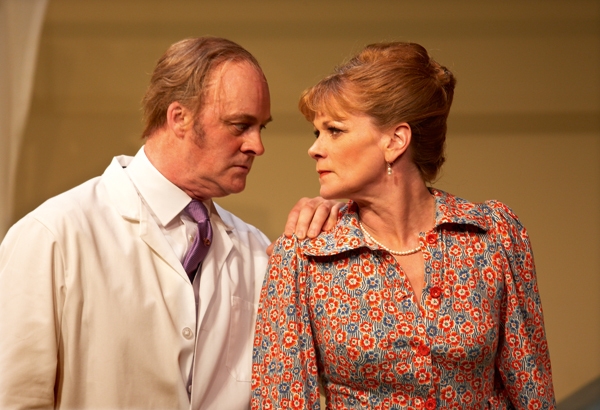It’s all Kenneth Halliwell’s fault. By bashing in Joe Orton’s head with a hammer, he brought the playwright’s career to a premature halt when Orton was still experimenting with brittle and anarchic farces. Had Orton lived beyond 34, he’d have developed his technique and become a richer, truer and more rounded artist. And What the Butler Saw would now be a minor work by a major playwright. Instead it’s a major work by a minor playwright.
Uneven in tone, lumpish in detail, unsure of its creative purpose, this is a problem play that doesn’t merit its status as a classic. Orton dashed it off in a few weeks and the script was discovered, after his death, lying in a drawer. The opening and closing scenes are dazzlingly original achievements but the middle section droops badly as Orton resorts to clichés — mistaken identity, cross-dressing, dropped trousers — in his search for inspiration.
The setting is a psychiatrist’s clinic. Dr Prentice, a randy shrink, is trying to rape his secretary while keeping the molestation hidden from his wife and from a visiting government inspector, who is himself certifiably mad. The dialogue between the Prentices reaches a glorious zenith of domestic savagery as they pick at the ruins of their marriage. Prentice calls his wife ‘the mistress of the fraudulent climax’ and ‘a nymphomaniac’ who will be ‘sent to the grave in a Y-shaped coffin’. She concurs. ‘My uterine contractions have been bogus for some time,’ she declares, as she slams the door on him.
It’s a wonderful exit line. Until you try exiting on it. It rarely gets a laugh because the phrase sounds unlike anything a woman would say about herself. However, a callow literary conjurer like Orton, with no romantic experience of women, might well imagine a female character expressing herself in those terms.
The script is full of these nearly-moments and not-quite-there-yet gags. But the production, marshalled by Sean Foley, is as good as it gets. The famously complicated set looks neat, quietly stylish and, above all, believable. The cast are terrific. Samantha Bond’s simmering, sophisticated ardour is perfect for Mrs Prentice. Omid Djalili plays the insane Dr Rance as a lovable, pop-eyed crackpot. And Tim McInnerny, as Prentice, is a joy to watch. He brings improbable quantities of fun, levity and warmth to a character who is nothing less than an alcoholic rapist.
Next, I popped up to Hampstead to ponder the new craze for turning hit movies into stage plays. It’s a curiously misguided enterprise, like distilling top-quality hooch from potatoes grown in Armagnac. The original film, Chariots of Fire, tells of the deadly rivalry between Harold Abrahams and Eric Liddell that came to a head at the 100m final of the 1924 Olympics. Only it didn’t. Some footling mishap with the timetable ensured that the big sprint-off never happened. So the plot doesn’t function.
The athletes themselves are entirely admirable but supremely unlikable. Abrahams is a chippy, mother-besotted drudge. His rival, Liddell, is a religious nuisance disguised as a taciturn prig. The minor characters are even harder work. Two simpering flappers offer a few glimpses of frigid romance. The Cambridge dons are suave and erudite duds with the mental agility of wax dummies and the moral outlook of minor Nazis. And Britain’s Olympic committee is filled with bullies, crawlers and bombastic jingos. Lord Lindsay, a rare exception, brings some charm and insouciance to the show in the debonair figure of Tam Williams.
What the play reveals is how hostile the rhythms of film and stage are to one another. We get an endless parade of short, choppy scenes with stuffy characters striding on, honking a few prejudices at each other, and marching off. And there’s the running. The running! Runners are running all the time, all over the place, around the revolving stage, behind the backs of the seats (the auditorium having been smashed up and restored to resemble a mini-stadium), and charging back on stage again to run, run, run a bit more until — flash, freeze-frame — they’re caught immobile as they breast the tape. For long passages the play is more a ballet than a drama.
Drilled and choreographed meticulously, it has the stale and ardent air of a civic pageant. Mind you, I was the only one slumbering in yawn-opolis at this show. I was roused from my stupor at the curtain call by the braying and roaring of a besotted crowd. They got up and stamped their little trotters so hard that my personal seismograph registered a major earthquake underfoot. Clearly, they’d seen something I’d missed: a rich and moving investigation of persistence, self-belief and glory. A good sign for those backing a West End transfer in June.






Comments